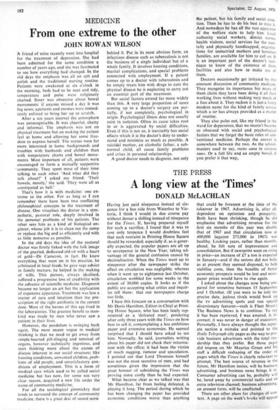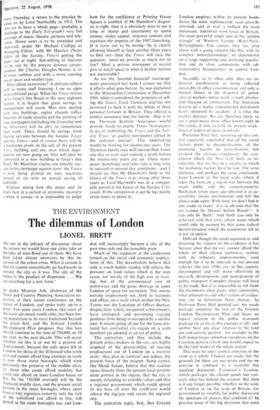THE PRESS
A long view at the 'Times'
DONALD McLACHLAN
Having just paid ninepence instead of six. pence for a bus ride from Waterloo to Vic- toria, I think I would in due course pay without demur a shilling instead of ninepence for the Times. If, having prepared myself for such a sacrifice, I found that it was to cost only tenpence I would doubtless feel that such restraint in Printing House Square should be rewarded; especially if, as is gener- ally expected, the popular papers are all up to sevenpence in the New Year, taking ad- vantage of the general confusion caused by decimalisation. When the Thnes went up to ninepence after the newspaper strike the effect on circulation was negligible; whereas when it went up to eightpence last October, circulation wobbled for some weeks to the extent of 30,000 copies. It looks as if the public are accepting what critics and inquir- ies tell them: that our newspapers charge too little.
I base this forecast on a conversation with Mr Denis Hamilton, Editor-in-Chief at Print- ing House Square, who has been lately rep- resented as a 'defeated man', pondering after only three years with the Times on how best to sell it, contemplating a less ambitious paper and extensive economies. He seemed surprised that I should have asked to see him. Normally, he said, journalists writing about his paper did not check their informa- tion with the office; it had been the victim of much nagging, rumour and speculation. I pointed out that Lord Thomson himself was not the most secretive of men, and had sometimes given the impression that the great honour of subsidising the Times was proving more costly than he had expected.
What became clear as we talked was that Mr Hamilton, far from feeling defeated, is playing it long. The period during which he has been changing the paper has provided economic conditions worse than anything that could be foreseen at the time of the takeover in 1967. Advertising is, after all, dependent on optimism and prosperity. Both have been shrinking, though he did emphasise that advertising revenue for the first six months of this year was double that of 1967 and that circulation now at 400,000 (against 275,000 in 1967) was healthy. Looking years, rather than months, ahead, he felt sure of improvement and consolidation. But if newsprint went on rising in price—an increase of L7 a ton is expected in January—and if the unions did not help, as at present they seemed disposed, to help stabilise costs, then the benefits of better economic prospects would be lost and news- paper prices would have to rise again.
I asked about the changes now being pre- pared for sometime between 15 September and 1 October. (If you were to be told the precise date, jealous rivals would book up the TV advertising spots and run special diversionary features—such is Fleet Street.) The Business News is to continue. To say it has been reprieved, I was assured, is in- correct; it was never in danger of execution. Personally, I have always thought the separ- ate section a mistake and pointed to the Daily Telegraph city pages as the way to pro- vide business advertisers with the total rea- dership that they prefer. But those pages did impose on Mr Maurice Green and his staff a difficult reshaping of the order of pages which the Times is clearly reluctant to attempt. The best source of revenue in the future, Mr Hamilton insists, will be business advertising, and business news brings it in. Consumer advertising can be, probably will be, lured away by commercial radio and an extra television channel; business advertising. on present form, will be unaffected.
There are other plans for changes of con- tent. A page on the week's books will appear every Thursday, a return to the practice in- sisted on by Lord Northcliffe in 1912. The Arts are to have a whole page—probably a challenge to the Daily Telegraph's very full coverage of music, theatre, pictures and tele- vision. Home news is to be extended arid improved, under Mr Michael Cudlipp as Managing Editor, with Mr Hamlyn (News Editor of the Sunday Times) getting the paper out at night. Sub-editing of features (to be run by the present defence corres- pondent Mr Charles Douglas-Home) is to be more ruthless and with a more cunning use of space and smaller type. What about economies? A delicate subject with so many staff listening. I see no signs of an editorial purge. When the Times moves up to Gray's Inn Road in the next eighteen months it is hoped that great savings in management will result. Men now dealing with two buildings, eighty chapels (office branches of trade unions) and the printing of four newspapers (including the Guardian and the Observer) will be ab!e to concentrate their work. There should be savings from sharing services between the Sunday Times and the Times—and of course there will be a handsome profit on the sale of the present Times building and site, over which nego- tiations are now going on. This will later be reinvested in a new building in Gray's Inn Road. Mr Hamilton claims one notable suc- cess in his campaign against costs: the Times IS now being printed on four machines instead of six with an annual saving of £400,000.
Without seeing how the paper and its rivals fare in a period of economic recovery —when it comes—it is impossible to judge how far the confidence at Printing House Square is justified. If Mr Hamilton's diagno- sis is right, then it is obviously wise to use a time of slump and uncertainty to spend money, widen appeal, improve content and maintain the impetus of the 1967 launching. If it turns out to be wrong—he is clearly allowing himself at least another three years to find out—then the Times will face the question: need we provide so much for so few? Must a serious newspaper of record give so much space to what is neither serious nor memorable?
As for the 'internal financial' rearrange- ment announced last week I cannot see that it affects what goes before. As was explained to the Monopolies Commission in December 1966, when it considered the propriety of sell- ing the Times, Lord Thomson and his son promised to back it with the whole of their personal fortunes in Britain. They offered a written assurance that the family—that is to say Thomson Scottish Associates—would -provide funds to enable Times Newspapers to go on publishing the Times and the Sun- day Times 'as quality newspapers edited in the national interest'. This undertaking would be binding for twenty-one years. The Thomson family may well recoup their losses one day or even start making a profit before the twenty-one years are up. These news- paper launchings and refits take a long time to succeed in present-day conditions—and I should say that Mr Hamilton's faith in the future of the. Times is as strong after three years as Lord Hartwell's was at a compar- able period in the future of the Sunday Tele- graph.lf the comparison is apt he has nearly seven years to prove it.































 Previous page
Previous page